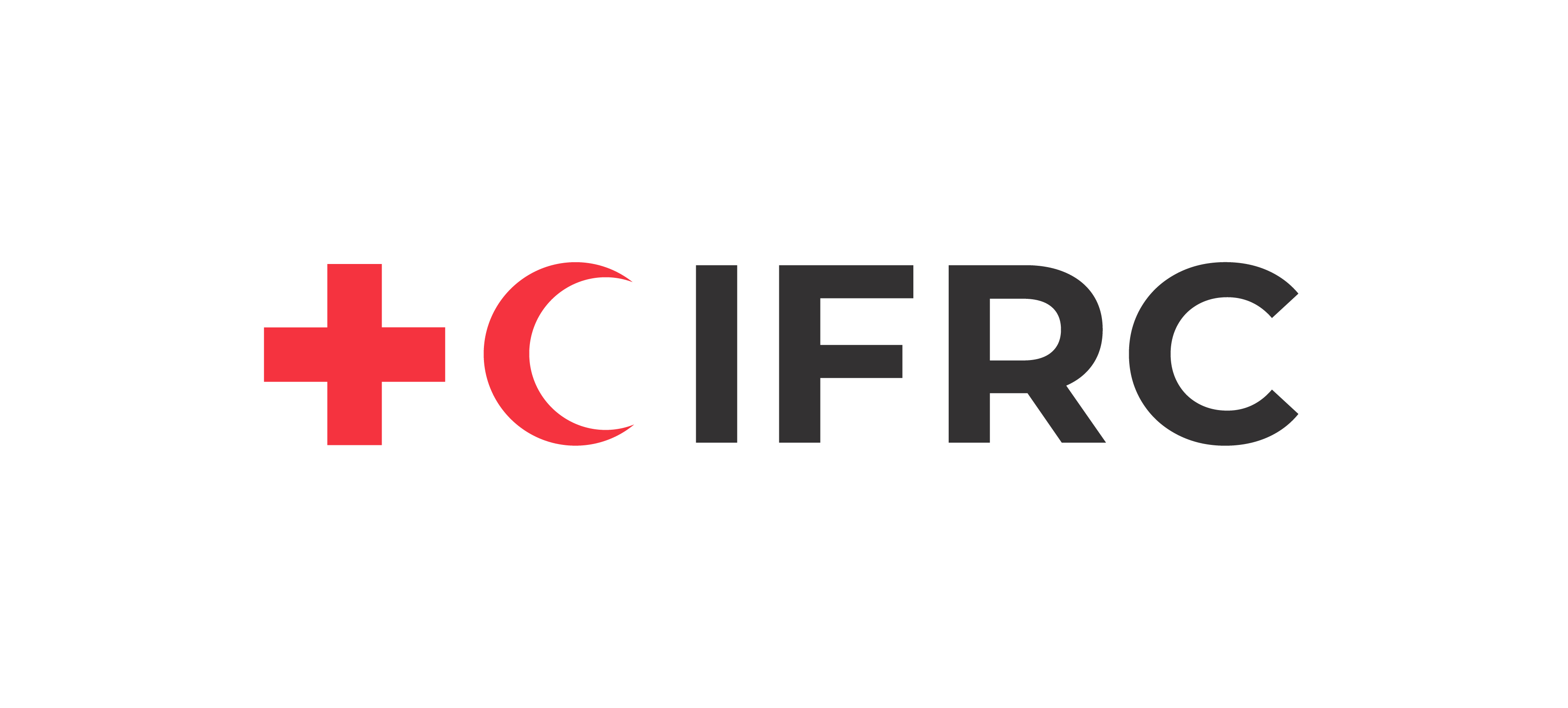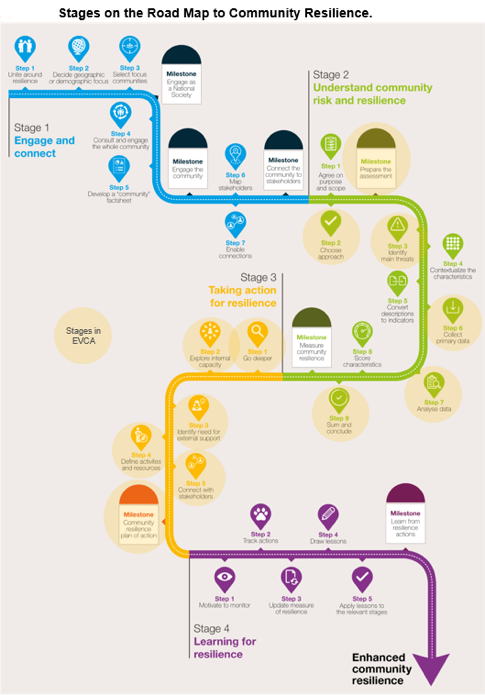
WHAT IS THE EVCA?
The Vulnerability and Capacity Assessment (VCA) is a participatory community risk assessment process. It enables communities, with the support of Red Cross Red Crescent National Societies when needed, to assess and analyse the risks they face, explore where these risks come from, which members of the community are most exposed, what coping capacities are available, and what initiatives can be undertaken to strengthen coping capacities and reduce the risks.
This enhanced VCA or “EVCA” provides a revised step by step guidance on how to conduct participatory community risk assessments.

THE EVCA IS:
why do an evca?
1
For communities to better understand the nature and extent of existing, changing and emerging risks they are and will be facing.
2
For communities to identify relevant and practical actions to reduce their risks and strengthen their resilience based on their priorities.
3
To raise awareness and mobilize resources within the community and externally so that the community can implement its risk reduction action plan.
4
For National Societies to support communities to reduce their prioritized risks, including by influencing policies, laws and development investments to benefit the communities.
What is new about THE evca?
The enhanced VCA or “EVCA” is the result of an extensive review of the VCA guidance and toolkit and its application within the Red Cross Red Crescent Movement (RCRC) that started in 2015. Read more about the enhancement process >
- The EVCA brings together all the previously published VCA guidelines and toolbox into one easy-to-access place.
- It has been aligned with the Roadmap to Community Resilience and has been adapted to better analyze the different characteristics of resilient communities. The ambition is to over time include the EVCA as an integral part of a revised/enhanced version of the Roadmap to Community Resilience, with the EVCA focusing mainly on the assessment and planning process/steps (from Stage 2 (related to understanding community risk and resilience) through to Stage 3 (related to taking action for resilience and developing a community resilience plan of action)).
- The EVCA now includes climate change considerations and gender and diversity considerations and guidance on how to conduct EVCAs in urban contexts. In future, it will also provide recommendations on how to conduct EVCAs in fragile and conflict-affected contexts and will also guide the utilization of digital tools.
You will find the following icons to indicate where we have incorporated climate change and gender and diversity guidance as well as new changes in the process:


evca and resilience
IFRC believes that strengthening community resilience entails (1) assisting communities to adopt risk-informed, holistic approaches to address their underlying vulnerabilities; (2) a demand-driven, people-centred approach; and (3) being (and remaining) connected to communities.
The EVCA is a useful tool for resilience work because it serves as an entry point to the community and provides a holistic risk landscape of the community. The EVCA has been adapted to better analyse the different characteristics of resilient communities.
How does the EVCA link to the IFRC's Roadmap to Community Resilience?
The EVCA focuses mainly on the assessment and planning process and therefore aligns with Stage 2 and Stage 3 of the Roadmap to Community Resilience (see highlighted portions in the diagram on the right). The Roadmap to Community Resilience includes a broader process of community engagement and follow-up.

evca and climate change
According to climate scientists, weather extremes that already affect communities are likely to occur more often and be more severe in the coming decades. More on the science of climate change in Climate change: the basics
Now communities need to not only take action based on their past experiences, but also plan for a more severe and uncertain future.
Climate change may already be familiar to communities. Communities in many parts of the world are already noticing changes to climate and weather patterns or ‘funny weather’ relating to temperature and rainfall (particularly people who depend on climate-related sources of income such as agriculture). In many cases, the observed new weather patterns are challenging traditional knowledge. Talking to communities about these changes provides people with an opportunity to come up with new strategies to deal with them, and incorporate these ideas into their “risk reduction plans” developed through the EVCA process.
evca IN URBAN CONTEXTS
The methodology of the EVCA is flexible enough to be relevant and applicable in every community whether it is in a rural, semi urban or urban setting. The main challenge in urban settings is how to identify which community is the most vulnerable and how to develop scalable solutions to the priority problems. Therefore, the EVCA should be preceded by a process to help the National Society narrow down the assessment from city level to community level.
New tools providing guidance on how to conduct city-wide risk assessments and urban profiling are helpful for National Societies planning to do EVCAs in urban contexts. The coalition building toolkit provides much needed guidance for National Societies to get better at working with a wider set of partners in urban areas.
EVCA and Epidemics
The early 21st century has seen several global health crises, including the COVID-19 pandemic and regional epidemics like Ebola and Zika. Factors such as climate change, urbanization, and unsustainable practices contribute to disease outbreaks, while endemic diseases like cholera and malaria continue to threaten communities worldwide.
To address these challenges, EVCA offers opportunities for National Societies to integrate epidemic risk analysis into community risk assessments and risk reduction planning. Epidemic risk analysis requires investing in technical health capacity and volunteer training, utilizing tools like the IFRC Epidemic Control Toolkit, and collaborating with external health stakeholders from local to national levels.
For the updated EVCA package with epidemic-focused resources, visit the Resources page to access training materials, resilience tools, guidance documents, checklists, and more.
EVCA and Early Warning Systems
As part of the Enhanced Vulnerability and Capacity Assessment (EVCA) approach, two new tools are available to support community-centered Early Warning Systems (EWS):
- The Communication Landscape Analysis Tool helps identify trusted communication channels to ensure early warnings reach everyone effectively.
- The Qualitative Guide for Focus Group Discussions enables practitioners to gather critical insights from communities and local authorities on the relevance, trust, and actionability of early warnings.
Please note that these are working documents and may be updated based on pilot testing and feedback.
THINGS TO CONSIDER BEFORE DECIDING TO CONDUCT AN EVca
Bear in mind that conducting an EVCA requires commitment and investment from your National Society and the community and therefore deserves careful consideration before making any decisions. It may require a change in mindset, roles and approach of your organization. Click here to read more on how to determine whether your National Society is ready to engage in an EVCA.
Once you've decided to do an EVCA, explore the step-by-step guidance:
EVCA Introduction
Enhanced vulnerability and capacity assessment guidance developed as a result of the recommendations of the global enhancement study
© International Federation of the Red Cross and Red Crescent Societies 2018